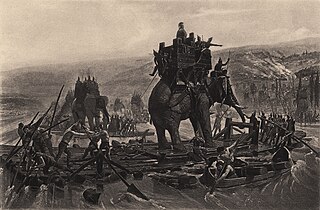Related Research Articles

The 3rd century BC started the first day of 300 BC and ended the last day of 201 BC. It is considered part of the Classical Era, epoch, or historical period.
This article concerns the period 229 BC – 220 BC.
Year 129 BC was a year of the pre-Julian Roman calendar. At the time it was known as the Year of the Consulship of Tuditanus and Aquillius and the Sixth Year of Yuanguang. The denomination 129 BC for this year has been used since the early medieval period, when the Anno Domini calendar era became the prevalent method in Europe for naming years.

This article concerns the 200 BC decade, that lasted from 209 BC to 200 BC.
This article concerns the period 119 BC – 110 BC.
This article concerns the period 129 BC – 120 BC.
This article concerns the period 139 BC – 130 BC.
This article concerns the period 269 BC – 260 BC.
This article concerns the period 259 BC – 250 BC.
This article concerns the period 239 BC – 230 BC.
This article concerns the period 219 BC – 210 BC.
This article concerns the period 189 BC – 180 BC.
This article concerns the period 199 BC – 190 BC.
Year 111 BC was a year of the pre-Julian Roman calendar. At the time it was known as the Year of the Consulship of Serapio and Bestia and the Sixth Year of Yuanding. The denomination 111 BC for this year has been used since the early medieval period, when the Anno Domini calendar era became the prevalent method in Europe for naming years.
Year 204 BC was a year of the pre-Julian Roman calendar. At the time it was known as the Year of the Consulship of Cethegus and Tuditanus. The denomination 204 BC for this year has been used since the early medieval period, when the Anno Domini calendar era became the prevalent method in Europe for naming years.
Year 205 BC was a year of the pre-Julian Roman calendar. At the time it was known as the Year of the Consulship of Scipio and Dives. The denomination 205 BC for this year has been used since the early medieval period, when the Anno Domini calendar era became the prevalent method in Europe for naming years.
Year 207 BC was a year of the pre-Julian Roman calendar. At the time it was known as the Year of the Consulship of Nero and Salinator. The denomination 207 BC for this year has been used since the early medieval period, when the Anno Domini calendar era became the prevalent method in Europe for naming years.
Year 208 BC was a year of the pre-Julian Roman calendar. At the time it was known as the Year of the Consulship of Marcellus and Crispinus. The denomination 208 BC for this year has been used since the early medieval period, when the Anno Domini calendar era became the prevalent method in Europe for naming years.
Year 215 BC was a year of the pre-Julian Roman calendar. At the time it was known as the Year of the Consulship of Albinus/Marcellus/Verrucosus and Gracchus. The denomination 215 BC for this year has been used since the early medieval period, when the Anno Domini calendar era became the prevalent method in Europe for naming years.
This article concerns the period 99 BC – 90 BC.
References
- ↑ Hung, Hing Ming (2011). The Road to the Throne: How Liu Bang Founded China's Han Dynasty. pp. 21–32. ISBN 978-0875868387.
- ↑ Hung, Hing Ming (2020). The Magnificent Emperor Wu: China's Han Dynasty. p. 175. ISBN 978-1628944167.